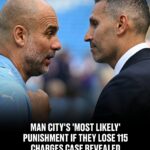Man City 115 charges latest after £250m transfer confusion as Arsenal watch on amid controversy

The English Premier League finds itself embroiled in one of the most significant regulatory controversies in modern football history. Manchester City, one of the league’s most successful clubs over the past decade, faces an unprecedented 115 charges related to alleged financial irregularities spanning multiple seasons. What makes this situation particularly complex is that while these charges hang over the club like a sword of Damocles, City continues to operate with apparent impunity, spending hundreds of millions of pounds on new players and maintaining their competitive edge.
The charges, first announced in January 2023, represent the most comprehensive investigation into a Premier League club’s financial conduct ever undertaken. They encompass allegations ranging from inflated sponsorship deals to failure to cooperate with investigations, painting a picture of systematic financial misconduct that, if proven, could fundamentally alter the landscape of English football.
The Nature of the Charges: Beyond Simple Overspending
To understand the magnitude of Manchester City’s predicament, it’s crucial to distinguish between the charges they face and the more straightforward Profitability and Sustainability Rules (PSR) violations that have affected clubs like Everton and Nottingham Forest. While PSR breaches typically involve clubs spending beyond their means and losing more than the permitted £105 million over a three-year period, City’s charges are far more complex and potentially damaging.
The 115 charges against Manchester City can be broadly categorized into several key areas:
Financial Misrepresentation and Fraud Allegations
The most serious accusations center on claims that City systematically misrepresented their financial position to regulators. This includes allegations of inflated sponsorship deals, particularly those involving companies with connections to the club’s ownership structure. The Premier League contends that City artificially boosted their revenue through these arrangements, allowing them to comply with Financial Fair Play regulations while actually operating outside the permitted parameters.
These allegations strike at the heart of financial integrity in football. If proven, they would represent not mere miscalculation or aggressive accounting practices, but deliberate deception designed to circumvent regulations that exist to maintain competitive balance and financial stability across the league.
Non-Cooperation with Investigations
A significant portion of the charges relates to City’s alleged failure to cooperate fully with both Premier League and UEFA investigations. This non-cooperation is itself a serious breach of league rules, as clubs are required to provide complete and accurate information when requested by regulatory bodies.
The significance of these charges cannot be overstated. In regulatory frameworks, the failure to cooperate with investigations often carries penalties as severe as the underlying violations being investigated. It demonstrates a pattern of behavior that suggests systematic attempts to obstruct justice and avoid accountability.
UEFA Compliance Failures
Additional charges relate to City’s failure to comply with UEFA’s Financial Fair Play regulations. While City successfully appealed UEFA’s initial sanctions at the Court of Arbitration for Sport (CAS), primarily on statute of limitations grounds rather than on the merits of the case, the Premier League’s charges suggest that domestic regulators view the evidence differently.
This aspect of the charges is particularly significant because it suggests a pattern of behavior that extends beyond domestic competition into European football, indicating a comprehensive approach to regulatory avoidance.
The Timeline of Controversy: From Charges to Silence
The journey from the initial announcement of charges to the current state of uncertainty has been marked by strategic delays and legal maneuvering that has frustrated fans, rivals, and regulatory observers alike.
January 2023: The Bombshell Announcement
The Premier League’s announcement of the charges in January 2023 sent shockwaves through the football world. The sheer number of charges – 115 in total – was unprecedented in Premier League history. The announcement came after years of investigation and represented the culmination of extensive forensic analysis of City’s financial records.
The charges covered a period from 2009 to 2018, encompassing the era when City transformed from a mid-table club to a dominant force in English and European football. This timeline is crucial because it covers the period when City’s most significant player acquisitions and infrastructure investments were made.
The Long Wait: Legal Strategy or Delaying Tactics?
Following the announcement, the football world expected a relatively swift resolution. However, the complexity of the case and the high stakes involved have contributed to significant delays. The trial finally commenced in November 2024, but even then, it was conducted largely in private, with minimal public information about proceedings or evidence.
The extended timeline has led to criticism from various quarters, with former Manchester United captain Gary Neville describing the situation as “an absolute stain to the game” and arguing that the delays have allowed the charges to be “pushed so far into the long grass that you end up losing the will to live on it.”
Post-Trial Spending Spree: Business as Usual?
Perhaps the most controversial aspect of the entire saga is Manchester City’s continued aggressive spending in the transfer market. Since the conclusion of the trial in November 2024, City has spent over £250 million on new players, including high-profile acquisitions like Omar Marmoush and several promising young talents.
This spending pattern raises fundamental questions about the regulatory framework governing English football. If a club can continue to operate normally while facing charges that could theoretically result in relegation or title stripping, what message does this send about the effectiveness of financial regulations?
The Current Transfer Activity: A Statement of Confidence or Desperation?
Manchester City’s recent transfer activity provides a fascinating window into the club’s strategic thinking and their confidence regarding the outcome of the charges. The club’s approach to the transfer market since the trial concluded suggests several possible interpretations.
The January 2025 Rebuild
City’s January 2025 transfer window was particularly noteworthy. Coming immediately after the conclusion of their trial, the club moved decisively to strengthen their squad. The acquisition of Omar Marmoush was seen as a statement signing, bringing proven quality to address immediate needs.
This January activity helped propel City to third place in the Premier League, demonstrating that their on-field performance remains largely unaffected by the off-field controversies. The club’s ability to maintain competitive standards while facing existential charges speaks to the robustness of their sporting infrastructure.
Summer 2025: Continued Investment
The summer transfer window has seen City maintain their aggressive approach to player recruitment. The confirmed signing of Rayan Ait-Nouri from Wolves and the expected acquisition of Rayan Cherki demonstrate that the club remains committed to squad enhancement despite the uncertainty surrounding their future.
These signings represent a blend of youth and experience, suggesting a long-term vision that extends beyond the immediate resolution of the charges. The club’s willingness to invest in young talent like Abdukodir Khusanov and Vitor Reis indicates confidence in their ability to develop and retain these players regardless of potential sanctions.
Strategic Implications
City’s continued spending can be interpreted in several ways:
Confidence in Vindication: The most straightforward interpretation is that City believes they will be cleared of the most serious charges and can therefore continue operating normally.
Maximizing Current Opportunities: Alternatively, the club may be attempting to maximize their competitive advantage while they still can, recognizing that future sanctions might limit their transfer activity.
Maintaining Normal Operations: From a legal and public relations perspective, maintaining normal business operations could be seen as demonstrating confidence in their position and avoiding any appearance of guilt.
The Regulatory Framework: Understanding the Rules at Stake
To fully appreciate the significance of Manchester City’s charges, it’s essential to understand the regulatory framework they allegedly violated and how it differs from other recent Premier League sanctions.
Financial Fair Play vs. Profitability and Sustainability Rules
The charges against City primarily relate to Financial Fair Play (FFP) regulations rather than the Profitability and Sustainability Rules (PSR) that have affected clubs like Everton and Nottingham Forest. While PSR violations typically result in points deductions and are relatively straightforward to adjudicate, FFP breaches can carry more severe penalties and are more complex to prove.
FFP regulations are designed to prevent clubs from spending beyond their means and to ensure that success on the pitch is achieved through sustainable financial management rather than unlimited external funding. The rules require clubs to balance their books over specific periods and to demonstrate that their revenue is legitimate and not artificially inflated.
The Precedent of Other Cases
Recent cases involving Everton and Nottingham Forest provide context for understanding potential penalties, but they also highlight why City’s situation is different. Both clubs were sanctioned for PSR violations, which are relatively straightforward to prove and penalize. Everton’s initial 10-point deduction (later reduced to 6 points) and Forest’s 4-point penalty established that the Premier League is willing to impose significant sporting sanctions for financial violations.
However, City’s charges are far more complex and potentially more serious. If proven, they would represent systematic deception rather than simple overspending, warranting more severe penalties.
The Potential Consequences: From Fines to Relegation
The range of potential penalties facing Manchester City is unprecedented in Premier League history. The league has confirmed that it has the power to impose sanctions ranging from fines to relegation and even title stripping.
Financial Penalties
The most lenient outcome would involve significant financial penalties. Given the scale of the alleged violations and City’s financial resources, any fines would need to be substantial to have meaningful impact. However, for a club of City’s wealth, even large fines might be considered a cost of doing business rather than a genuine deterrent.
Points Deductions
Points deductions represent a more significant sporting penalty. Given that Everton received a 6-point deduction for a single PSR violation, City could potentially face massive points deductions if found guilty of multiple charges. However, the scale of such penalties would likely be contested vigorously and could lead to lengthy appeals processes.
Relegation
The most severe sporting penalty would be relegation to the Championship. This would represent an unprecedented punishment in modern English football and would have massive implications for the club, its players, and the broader football ecosystem.
Relegation would likely trigger a mass exodus of players, coaching staff, and potentially ownership changes. The financial implications would be enormous, potentially affecting the club’s ability to service debts and maintain its infrastructure.
Title Stripping
Perhaps the most controversial potential penalty would be the retrospective stripping of titles won during the period covered by the charges. This would affect Premier League titles won between 2009 and 2018, potentially redistributing honors to other clubs.
The precedent for title stripping in football is limited but not unknown. Juventus was stripped of Serie A titles following the Calciopoli scandal, demonstrating that even the most successful clubs are not immune to such sanctions when found guilty of serious violations.
The Impact on Rivals: Arsenal and the Competitive Landscape
Manchester City’s dominance over the past decade has significantly impacted their rivals, particularly Arsenal, who have finished second to City in two of the past three seasons. The potential for retrospective sanctions has created a complex emotional and strategic landscape for these competing clubs.
Arsenal’s Perspective
Arsenal supporters have watched their team fight valiantly against City’s “empire of depth and quality,” coming tantalizingly close to ending their title drought only to be denied by a club now facing serious charges. The potential that this success was achieved through illegal means adds a layer of frustration and injustice to their near-misses.
If City is found guilty and faces retrospective penalties, Arsenal could potentially be awarded titles they narrowly missed. However, the satisfaction of such awards would be complicated by the fact that they were not earned on the pitch in real-time.
Broader Competitive Implications
The uncertainty surrounding City’s future has created strategic dilemmas for all Premier League clubs. Rivals must plan for multiple scenarios: a world where City continues to dominate, one where they face severe sanctions, and various outcomes in between.
This uncertainty affects everything from transfer planning to long-term strategic development. Clubs must balance the desire to compete with City’s current strength against the possibility that the competitive landscape could change dramatically.
Expert Analysis: The View from Outside
Football finance experts and legal analysts have provided various perspectives on the likely outcome of the charges, though consensus remains elusive.
The Optimistic View for City
Some experts, including football finance specialist Kieran Maguire, suggest that City may have “the upper hand over the Premier League” based on historical evidence from similar cases. This view is supported by City’s successful appeal against UEFA sanctions at CAS, which demonstrated their ability to challenge regulatory decisions effectively.
The complexity of the charges works both ways: while they represent serious allegations, they also create multiple opportunities for legal challenge and mitigation. City’s legal team has had years to prepare their defense, and the club’s resources allow for the most sophisticated legal representation available.
The Pessimistic View for City
Other legal experts suggest a more nuanced outcome, with lawyer Nick DeMarco predicting a “score draw” where the Premier League wins some charges while City successfully defends against others. This scenario would likely result in penalties that are significant but not catastrophic for the club.
The Regulatory Perspective
From a regulatory standpoint, the Premier League faces pressure to demonstrate that its rules have teeth. The extended timeline and continued controversy have created reputational risks for the league itself, potentially undermining confidence in its regulatory framework.
The Broader Context: Financial Fair Play in Modern Football
Manchester City’s case exists within a broader context of evolving financial regulations in football. The traditional model of Financial Fair Play is under increasing pressure as clubs find sophisticated ways to circumvent rules while maintaining the appearance of compliance.
The Evolution of Financial Regulations
Financial Fair Play was introduced to prevent clubs from spending beyond their means and to ensure competitive balance. However, the reality has been more complex, with wealthy clubs finding ways to navigate the rules while maintaining their competitive advantages.
City’s case represents a test of whether current regulations are fit for purpose or whether more fundamental reforms are needed to ensure genuine competitive balance and financial sustainability.
The Role of Ownership Models
The charges against City also raise questions about ownership models in modern football. The club’s ownership by the Abu Dhabi United Group, part of the broader City Football Group, creates complex relationships that traditional financial regulations may not adequately address.
These ownership structures can create opportunities for related-party transactions and other arrangements that may technically comply with regulations while undermining their spirit and intent.
The Waiting Game: What Happens Next?
As the football world continues to wait for a resolution, several scenarios remain possible:
Immediate Resolution
The most straightforward outcome would be a clear verdict that either vindicates City or imposes significant penalties. This would provide closure and allow all parties to move forward with certainty.
Continued Delays
Unfortunately, the more likely scenario may be continued delays as City exercises all available legal options to challenge any adverse findings. This could extend the uncertainty for months or even years.
Negotiated Settlement
A third possibility is a negotiated settlement that allows both parties to claim partial victory while avoiding the most extreme outcomes. This might involve moderate penalties that City accepts in exchange for avoiding the risk of more severe sanctions.
Conclusion: The Stakes for English Football
The Manchester City charges represent more than just a regulatory dispute; they are a defining moment for English football’s commitment to financial integrity and competitive fairness. The outcome will set precedents that will influence how football is governed for years to come.
If City is cleared of the most serious charges, it will raise questions about the effectiveness of current regulations and the Premier League’s ability to enforce its rules against the most powerful clubs. Conversely, if City faces severe penalties, it will demonstrate that no club, regardless of success or resources, is above the law.
The continued uncertainty serves no one’s interests and undermines confidence in the regulatory framework that underpins the Premier League’s credibility. Whatever the outcome, the case highlights the need for clearer, more robust financial regulations that can effectively govern modern football’s complex financial landscape.
As Manchester City continues to spend and compete at the highest level while these charges remain unresolved, the football world watches and waits, knowing that the eventual resolution will have implications far beyond one club’s fate. The integrity of English football itself hangs in the balance, and the longer the wait continues, the more damage is done to the sport’s reputation and competitive credibility.
The ultimate question remains: will justice be served, or will the complexity of modern football finance allow even the most serious allegations to be obscured by legal maneuvering and procedural delays? Only time will tell, but the stakes could not be higher for Manchester City, their rivals, and the Premier League itself.















